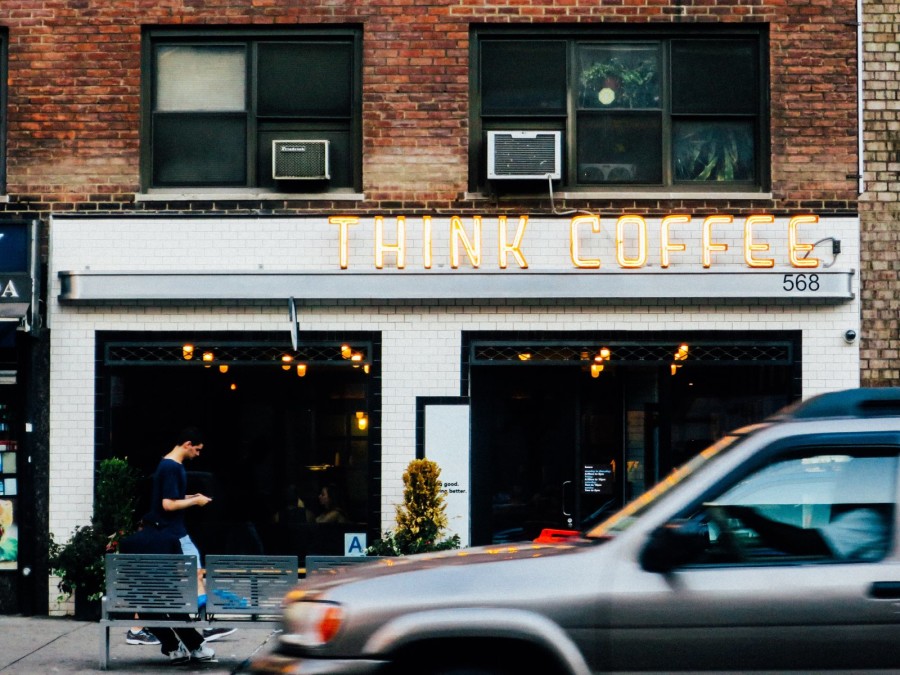Why do so many of us love going to cafes so much? My theory used to be that cafes offer a feeling of home away from home and an office away from an office. We tend to associate both coziness and gentle stimulation with the cafe environment. But could it be that we are simply hooked on caffeine and that all the wonderful things we love about coffee and tea — the piping hot steam, the unmistakable aroma and the varied flavours — are only a byproduct, a secondary effect, of our addiction to caffeine?
For travellers, a cafe is one of the few places they can park themselves for a while to take a break and regroup when they are away from their hotel. In our everyday life, we meet our friends there or take our work there. Even if we go there alone, there is something comforting about sitting at a cafe in the company of strangers, with no obligation to speak or even to greet.

At times, we go to cafes to rest our eyes on printed words and take an occasional break from the online chatter. However, it seems that these days we more often go to cafes for free WiFi, precisely because we are dying to get online, especially when traveling with no roaming service! Even when we’re not travelling our work or personal habits are increasingly causing us to interact more in virtual reality and less with real people. Cafes provide a solution to the solitary confinement of an “online” job because they allow us to be in the company of others rather than being cooped up in our house alone.
Mitch Ditkoff aptly presents “20 Reasons Why Creative People Like to Go to Cafes to Work” in his Huffpost article. The first four goes like this:
1. It doesn’t feel like work.
2. It’s a nice break from the office.
3. You don’t have an office.
4. Easy access to caffeine.
Note that Mitch lists “caffeine” as No. 4, but a brief look at the significant impact that caffeine arguably had in shaping the world’s history made me rethink — perhaps it should be moved to No. 1, because the foremost reason why we go to cafes may be that we are simply hooked on caffeine…the last socially acceptable addiction.
All Viennese love a good coffee house
Vienna was once known as the world’s leading city for coffee house culture and espionage. The first of Vienna’s coffee houses and the subsequent rapid propagation of them was in fact, started by an Armenian spy named Diodato when he opened his first cafe in 1683. This intriguing man served at the Viennese Imperial court and was accused of spying for both the Hapsburgs and the Serbians. Today travellers can find The Johannes-Diodato-Park in the 4th district of Vienna, a park dedicated to Diodato.
At the turn of the 20th century, the Viennese coffee house culture really exploded in popularity. These cafes became gathering places of the artists, journalists and writers who had become disillusioned in the aftermath of the First World War and faced the total demise of everything they had previously believed in.
Although all Viennese still love a good coffee house and are proud of their coffee culture (just try to learn the myriad names of Viennese coffee drinks as a foreigner and you will gain a new respect for their coffee culture) and coffee houses played an integral part in shaping Viennese culture and history, Vienna is not the cradle of the European coffee house, contrary to many people’s impression. The earliest evidences of world’s coffee houses, dating back to the 12th century, are found in Mecca and the first coffee house in Europe actually appeared in Venice in 1647.
One of my favorite coffee houses in Vienna is Phil, located at Grumpendorferstrasse 10-12, 1060 Vienna. It’s a modern, unpretentious bookshop-cafe that also serves a great breakfast and brunch. Lisa at cookiesound has a nice list about Phil and other popular Vienese cafes, both modern and traditional, that are worth checking out.

Huge impact on world history
The status of coffee and tea houses as an arena for free expression, political protests, and revolutionary ideas developed very early in other parts of Europe beyond Vienna. For instance, in 17th-century France, the royal court lost its central function as a public forum and by the 18th century all of the great writers and thinkers pursued their ideas and work at tea salons.
Some theorize that the caffeine found in tea, fueled these great thinkers and writers with energy and creativity to create and chisel their ideas late into the night, and their addiction to caffeine brought them back to cafes again and again. For instance, the prolific French writer Balzac, is known to have resorted to eating dry coffee grounds to achieve the stimulating effect when he wrote. He died at age 49.
Moreover, some have argued that many of the most significant events in European and American history, such as the slave trade, colonialism and the Industrial Revolution, transpired due to the addictive quality of caffeine contained in tea, coffee and chocolate. After all, these items were among the most sought-after commodities of the colonial era. In England, rural farmers were forced to overcome their natural circadian rhythm and work through the night. They were able to maintain longer working hours by consuming caffeine. As a result, coffee played a huge role in ushering in a new process of manufacturing and introduced us to the Industrial Revolution.
Next time you go to a cafe…
Next time your sipping your favourite caffeinated beverage at your local coffee shop, you might see your relationship to your favorite drink and cafes in a different light. Personally, understanding the history of cafe culture has given me a whole new respect for caffeine and its incredibly rich origin stories. That’s part of why we love it! So pick up a book and head to your local cafe to enjoy a cup of the good stuff!


